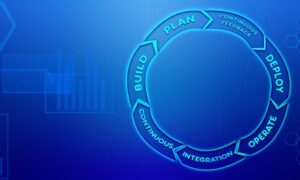Software development companies looking to implement DevOps require a team with collaborative skills. The team should also be ready to change and adopt new software development technologies. The team we are talking about here is DevOps engineers.
Generally, DevOps engineers understand automation tools, systems, version control systems, CI tools, and networking. Besides, they are experienced in using project management tools to improve DevOps workflow.
If you want to become a DevOps engineer, you need to understand that DevOps isn’t specific to system engineers or developers. Rather, it’s the perfect career for anyone passionate about evolving technologies and practices. Besides, anyone who wants to become a DevOps engineer must be ready to work in a collaborative environment, where all the processes are automated to simplify everything for all team members.
So, it doesn’t matter whether you are a developer, tester, system admin, support engineer, or performance engineer—you can still become a DevOps engineer. And why is this? It’s because you are part of an IT environment responsible for developing and managing software development processes. This post will discuss what you need to become a DevOps engineer. Read on for more information.
Understand the DevOps culture
The first thing you have to do when becoming a DevOps engineer is to understand the DevOps culture. This means understanding how continuous integration, delivery, and deployment work to provide a better working environment for software development organizations.
The DevOps culture has four main pillars: collaboration, communication, automation, and measurement. The four pillars encourage companies to take a new approach when solving problems instead of looking for single solutions from individuals who’re usually assigned specific tasks.
If you want to become a successful DevOps engineer, you must understand how these four pillars can maximize software quality and support building sustainable software products.
Learn container orchestration tools
As a DevOps engineer, container orchestration tools like the Kubernetes container platform are critical because you have to manage the whole application deployment process. You have to create development environments and maintain them to use them at any given time.
You should also note that containers are becoming part of innovative cloud computing models because several software development companies use them today to reduce the workload of their software engineers, who have to manage multiple projects simultaneously. So, if you want to become a successful DevOps engineer, you must learn how container orchestration tools such as Kubernetes can help you deploy and scale applications on various platforms without downtime or interruptions.
Learn CI tools
Continuous integration (CI) is an essential part of DevOps culture. It lets you build and test software automatically without manual interventions from developers or testers during the applications’ testing phase. This means no downtime while trying new releases and updates to automation testing tools such as Selenium.
Moreover, CI helps you manage your application’s build process and automate it so that deployments can be done at any time without wasting your resources. So, if you want to become a successful DevOps engineer, you must learn how CI tools such as Jenkins can help you improve code quality and create new builds for various software releases.
Learn version control systems
This is another important thing you should do to become a successful DevOps engineer. Version control systems such as Git help software development teams collaborate and manage their projects without problems.
Moreover, you should know that because of the popularity of Git, companies realize the importance of version control for app deployments. This is a feature that makes version control so useful is its ability to track changes in code and store them in a central repository that numerous team members can access at once.
Learn relational databases
Relational database management systems (RDBMS) are still the most commonly used database models in organizations today because they provide high data integrity and security for business applications. They also provide better performance than other types of databases available today, such as NoSQL or graph databases, since RDBMS tables store all necessary metadata required by an app.
Moreover, RDBMS is ideal for online transactions and data sharing by companies that manage user accounts and track their preferences. So, if you want to become a successful DevOps engineer, you must learn relational databases such as MySQL as part of your software development knowledge.
Learn cloud computing services
This means understanding how different cloud models such as Platform as a Service (PaaS), Infrastructure as a Service (IaaS), and Software as a Service (SaaS) work to support your team and its developers better when building new apps on the cloud.
Notice that most software development teams today rely on public or private clouds to reduce costs and provide faster deployments of applications on different platforms. This is why you need to learn cloud computing so that your team can focus on delivering new software releases instead of spending time resolving issues related to infrastructure, networking, or server failure.
Learn data science concepts
Data science has become more popular in software development companies because they need new ways to help them generate useful insights from huge datasets containing relevant information about customer behavior and preferences. With the rapid expansion of big data analytics tools such as Apache Spark, learning how data science concepts can help teams build smarter apps without wasting resources has become essential for software engineers responsible for managing application quality assurance processes.



































